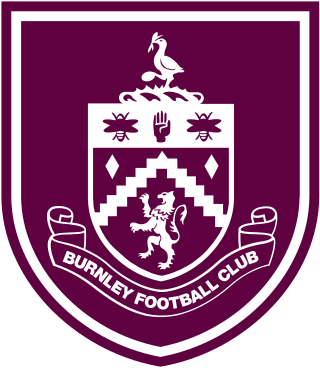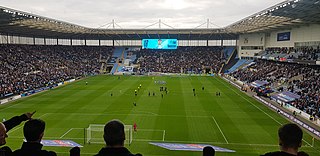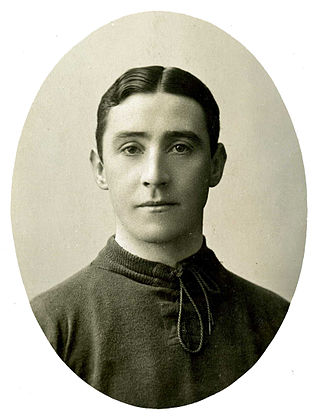
Bolton Wanderers Football Club is a professional association football club based in Bolton, Greater Manchester, England. The team competes in League One, the third level of the English football league system.

Burnley Football Club is a professional football club based in Burnley, Lancashire, England. The club competes in the EFL Championship, the second tier of English football, following relegation from the Premier League in 2023–24. Founded in 1882, Burnley were one of the first to become professional and subsequently put pressure on the Football Association to permit payments to players. They entered the FA Cup for the first time in 1885–86 and were one of the 12 founder members of the Football League in 1888–89. Burnley were the second, and are one of only five sides to have won all four professional divisions of English football.

Gavin John Ward is an English former professional footballer and coach, who is currently interim goalkeeping coach at Championship side Cardiff City

Wasps Rugby Football Club was a professional rugby union team. They last played in Premiership Rugby, the top division of English rugby, until being suspended on 12 October 2022. On 17 October 2022, the club entered administration, resulting in relegation from the league and all staff being made redundant. They exited administration on 16 December 2022.
James McIlroy was a Northern Ireland international footballer, who played for Glentoran, Burnley, Stoke City and Oldham Athletic. He was regarded as one of Burnley's greatest players, having played 497 matches and scoring 131 goals. McIlroy also managed Oldham Athletic and Bolton Wanderers.
James Colin Harvey is an English former professional footballer who is best known for his time as a player, coach and manager with Everton.

Turf Moor is an association football stadium in Burnley, Lancashire, England, which has been the home of Burnley Football Club since 1883. This unbroken service makes Turf Moor the second-longest continuously used ground in English professional football. The stadium is situated on Harry Potts Way, named after the manager who won the 1959–60 First Division with the club, and has a capacity of 21,944.

The Coventry Building Society Arena is a complex in Coventry, West Midlands, England. It includes a 32,609-seater stadium which is currently home to football team, Championship club Coventry City F.C. along with facilities which include a 6,000 square metres (65,000 sq ft) exhibition hall, a hotel and a casino. The site is also home to Arena Park Shopping Centre, containing one of UK's largest Tesco Extra hypermarkets. Built on the site of the Foleshill gasworks, it is named after its sponsor, Coventry Building Society who entered into a ten-year sponsorship deal in 2021. For the 2012 Summer Olympics, where stadium naming sponsorship was forbidden, the stadium was known as the City of Coventry Stadium.

Owen Columba Coyle is a professional football manager and former player who is currently the head coach of Indian Super League club Chennaiyin. He played as a striker for several clubs in England and Scotland, and made one appearance for the Republic of Ireland national team.

James Hogan was an English football player and coach. He enjoyed some success as a footballer, reaching an FA Cup semi-final with Fulham in 1907–08, but his primary legacy is as a pioneer of the game and as an innovative coach across multiple European club and national sides. Named "the most influential coach there has ever been" by Jonathan Wilson, Hogan is regarded by some as the architect of Total Football.

Marc Peter Tierney is an English former professional footballer. Predominantly a left-back, Tierney could play in other positions, such as centre-back. His brother Paul is also a retired professional footballer.

The Ninety-Two Club is a groundhopping society, in order to be a member of which a person must attend an association football game at the stadium of every current Premier League and EFL Championship, EFL League One, EFL League Two club in England and Wales.

The 1914 FA Cup final was an association football match between Burnley and Liverpool on 25 April 1914 at Crystal Palace, London. It was the final match of the 1913–14 FA Cup, the 43rd season of the country's primary cup competition, the FA Cup. Both teams were appearing in their first FA Cup final. Burnley and Liverpool, as members of the Football League First Division, entered the competition in the first round and progressed through five rounds to reach the final, both playing seven matches including two replays. Burnley had eliminated four clubs from the First Division en route to the final.
Brian Borrows is an English football coach and former professional footballer who is a regional coach for the Professional Footballers' Association.
Paul Comstive was an English professional footballer who mainly played as a midfielder. He played in the Football League for seven different clubs and also played non-league football.
The 2010–11 season was Bolton Wanderers's twelfth season in the Premier League, and their tenth consecutive season in the top-flight of English football.
The 2013–14 season was Bolton Wanderers' second consecutive season in the Football League Championship following their relegation from the Premier League in 2012.
UCFB is a higher education institution offering undergraduate and postgraduate university degrees and executive education in the football and wider sports industries. UCFB is a college of the University of East London.

Daniel Ebenezer Kwasi Agyei is an English professional footballer who plays as a striker for EFL League One club Leyton Orient.
Burnley Football Club is an English professional association football club based in Burnley, Lancashire. It was founded on 18 May 1882 by members of rugby club Burnley Rovers, who voted for a change from rugby to association football. The suffix "Rovers" was dropped in the following days. Burnley became professional in 1883—one of the first to do so—putting pressure on the Football Association (FA) to permit payments to players. In 1885, the FA legalised professionalism, so the team entered the FA Cup for the first time in 1885–86, and were one of the twelve founder members of the Football League in 1888–89.











